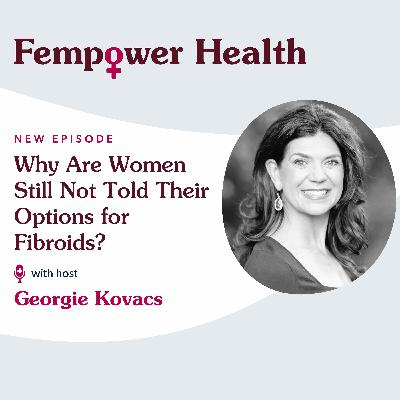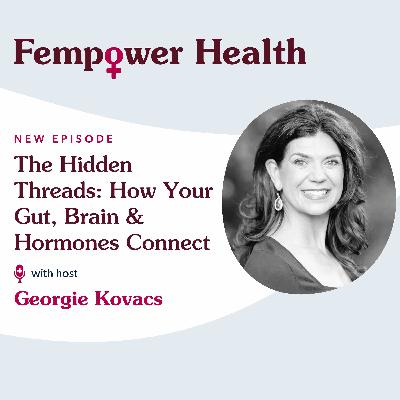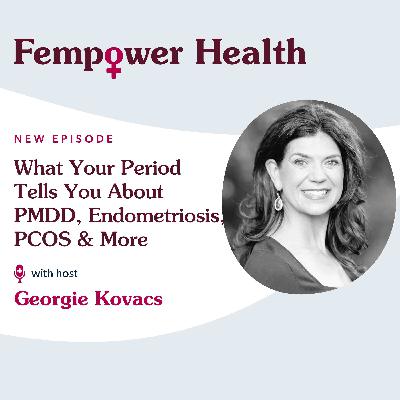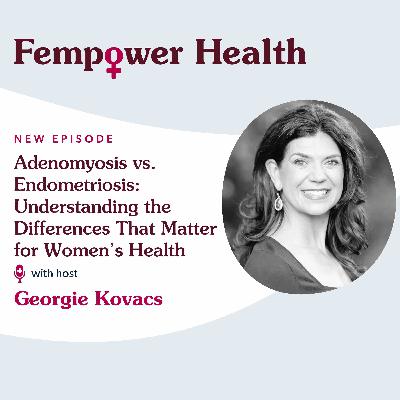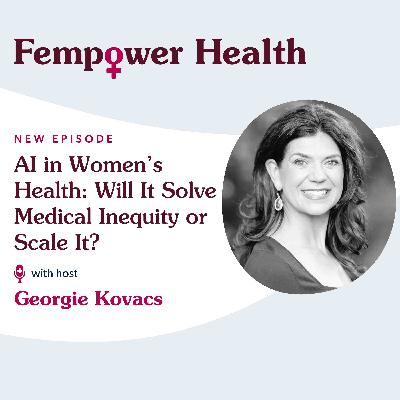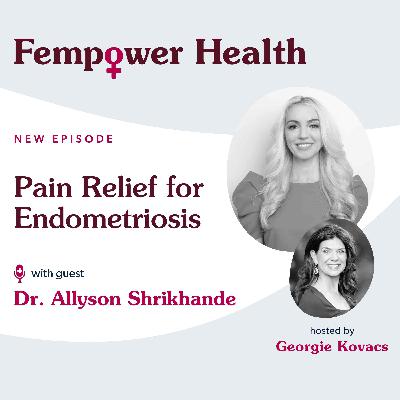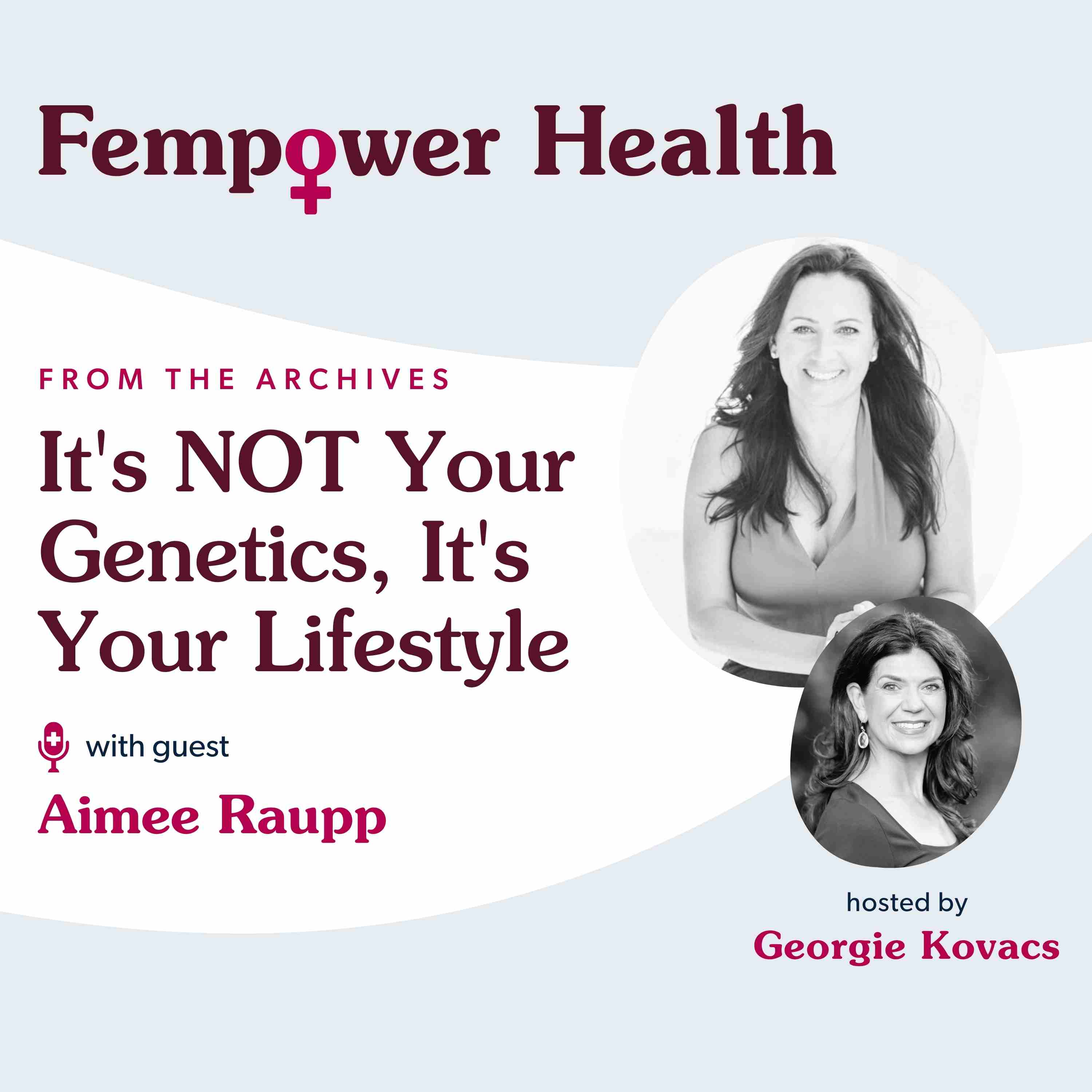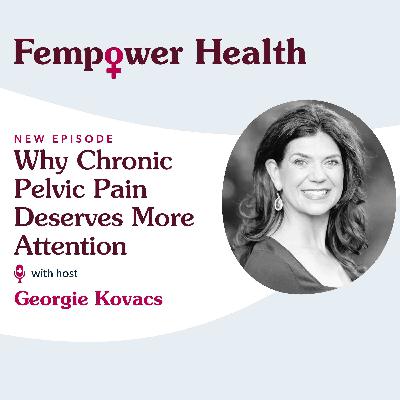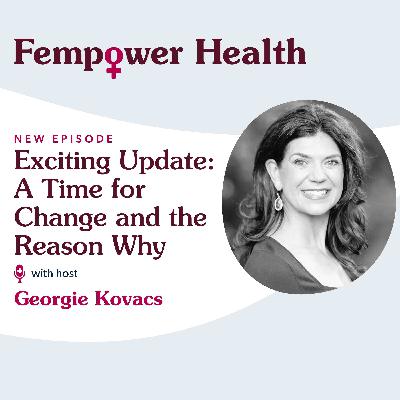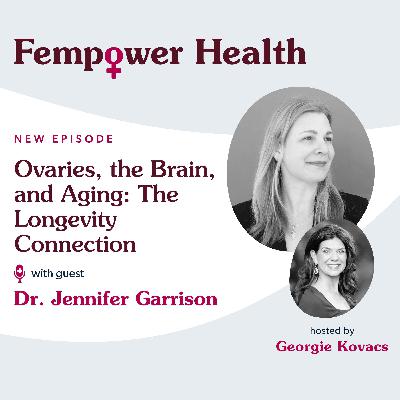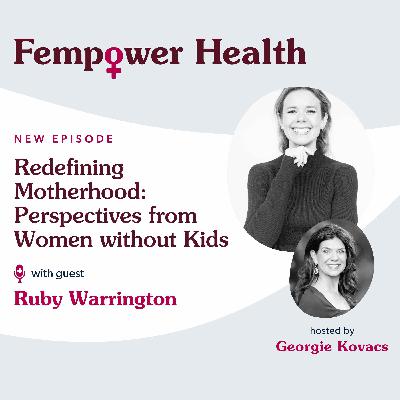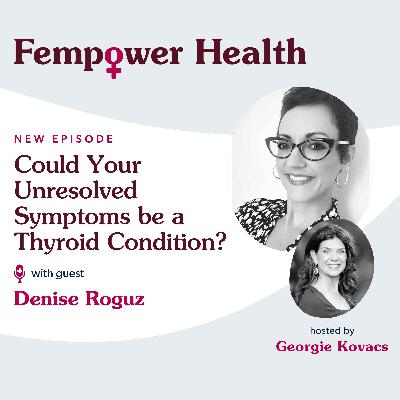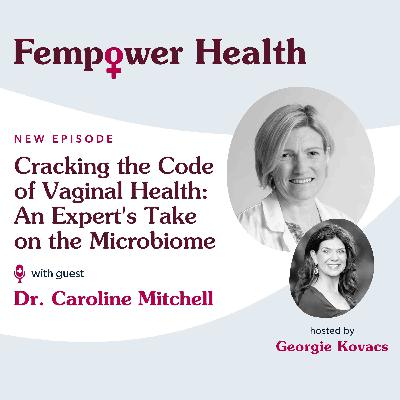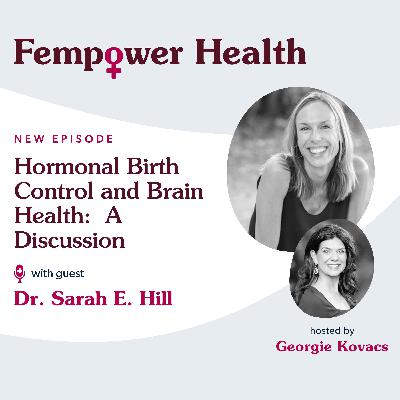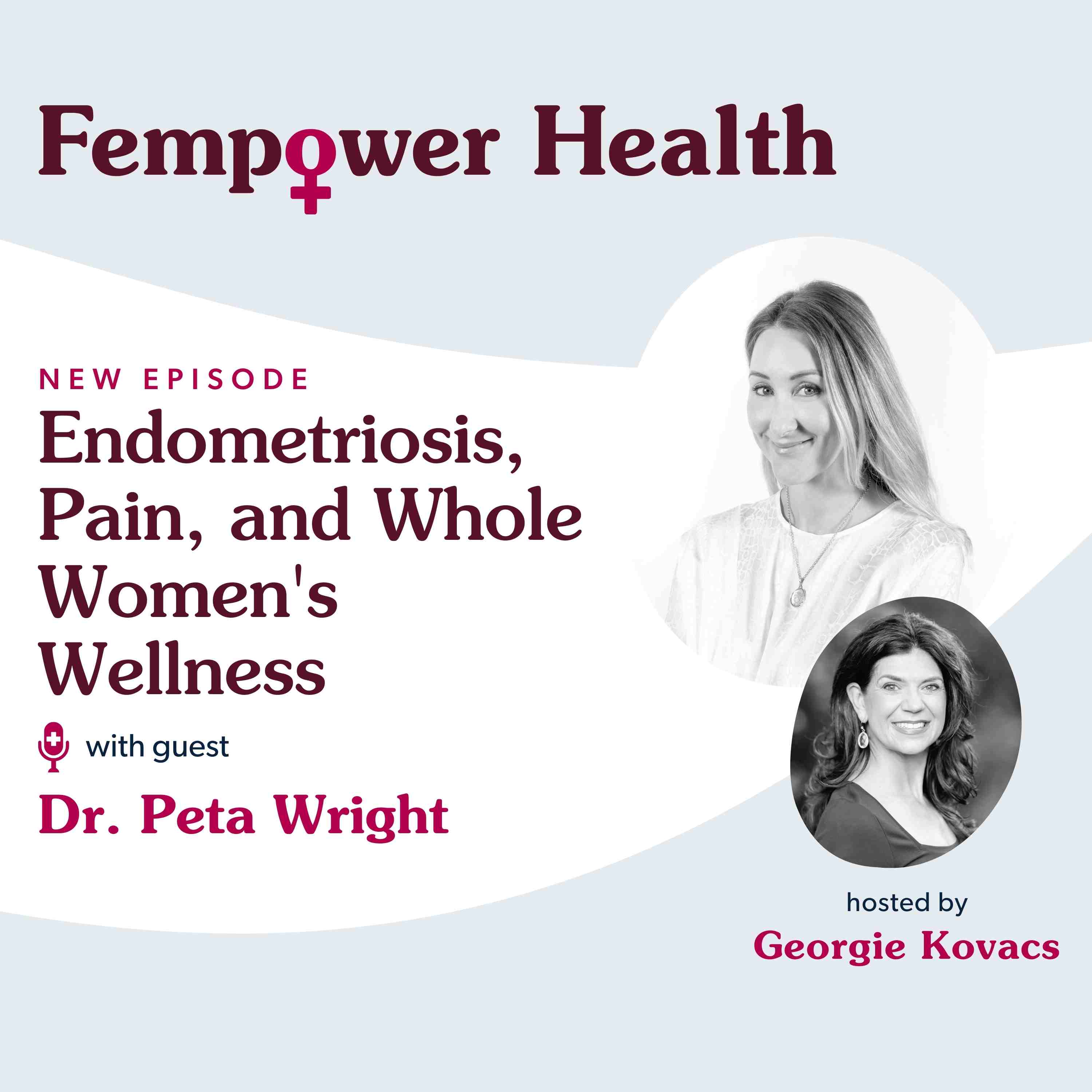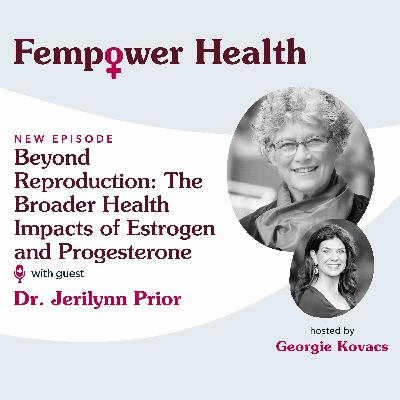Discover Fempower Health: The Perimenopause and Menopause Channel
Fempower Health: The Perimenopause and Menopause Channel

Fempower Health: The Perimenopause and Menopause Channel
Author: Georgie Kovacs
Subscribed: 8Played: 21Subscribe
Share
© 2024 Fempower Health
Description
Empowering women through every stage of life isn't just our mission; it's our passion. At Fempower Health, we are dedicated to providing a supportive platform where your voice is heard, and your concerns are addressed with the compassion and understanding you deserve. Our podcast is specifically designed for women navigating the perimenopause and menopause phases of life, offering trusted, medically-backed information to empower you to advocate for quality healthcare.
What We Offer:
Comprehensive Topics: Our podcast covers all aspects of perimenopause and menopause, including symptom management, hormonal changes, mental health impacts, and more. We delve into often overlooked topics, ensuring you have the information you need to navigate this transformative stage of life.
Expert Insights: Gain access to world-renowned healthcare experts, including doctors, researchers, and patient advocates. Our episodes feature in-depth discussions on the latest research, actionable takeaways, and real-life stories, providing a multifaceted perspective on menopause.
Supportive Community: Feel seen and heard. We offer language and information on self-advocacy, helping you understand how to communicate with your healthcare providers effectively and find the right specialists for your needs.
Our Mission:
To equip women with quality, expert-driven information that empowers them to advocate for better healthcare. Our vision is to change the way society approaches women’s health, ensuring every woman feels supported and informed.
Join Our Community:
Beyond the podcast, Fempower Health extends its support through a rich array of women's health resources available on our website. Stay connected and informed through our social media channels and newsletter, where we continue to share health tips and the latest developments in women's healthcare.
Sign up for the newsletter:
📣 Get the latest women's health news via the weekly newsletter: https://fempower-health-peri-menopause.beehiiv.com/subscribe
Stay Connected:
📲 Follow Fempower Health for more engaging content, expert interviews, and resources on women's health and wellness on
🌐 Website: https://www.fempower-health.com
🔅 Instagram: https://www.instagram.com/fempowerhealth.peri.meno
🔅 Facebook: https://www.facebook.com/fempowerhealth.peri.meno
🔅Twitter: https://www.twitter.com/peri_meno_hub
🔅TikTok: https://www.tiktok.com/fempowerhealth.peri.meno
Our founder, Georgie Kovacs, brings over two decades of healthcare experience and a personal touch to Fempower Health. Inspired by her own health journey, Georgie ensures that Fempower Health stands as a trustworthy and diligent advocate for women's health. This dedication is reflected in our rigorous vetting process for all guests, ensuring you receive reliable, actionable information.
Join Fempower Health as we explore, educate, and empower you to take control of your health journey. Here, we not only discuss what matters but also provide a path forward, offering a community where you are seen, heard, and valued.
What We Offer:
Comprehensive Topics: Our podcast covers all aspects of perimenopause and menopause, including symptom management, hormonal changes, mental health impacts, and more. We delve into often overlooked topics, ensuring you have the information you need to navigate this transformative stage of life.
Expert Insights: Gain access to world-renowned healthcare experts, including doctors, researchers, and patient advocates. Our episodes feature in-depth discussions on the latest research, actionable takeaways, and real-life stories, providing a multifaceted perspective on menopause.
Supportive Community: Feel seen and heard. We offer language and information on self-advocacy, helping you understand how to communicate with your healthcare providers effectively and find the right specialists for your needs.
Our Mission:
To equip women with quality, expert-driven information that empowers them to advocate for better healthcare. Our vision is to change the way society approaches women’s health, ensuring every woman feels supported and informed.
Join Our Community:
Beyond the podcast, Fempower Health extends its support through a rich array of women's health resources available on our website. Stay connected and informed through our social media channels and newsletter, where we continue to share health tips and the latest developments in women's healthcare.
Sign up for the newsletter:
📣 Get the latest women's health news via the weekly newsletter: https://fempower-health-peri-menopause.beehiiv.com/subscribe
Stay Connected:
📲 Follow Fempower Health for more engaging content, expert interviews, and resources on women's health and wellness on
🌐 Website: https://www.fempower-health.com
🔅 Instagram: https://www.instagram.com/fempowerhealth.peri.meno
🔅 Facebook: https://www.facebook.com/fempowerhealth.peri.meno
🔅Twitter: https://www.twitter.com/peri_meno_hub
🔅TikTok: https://www.tiktok.com/fempowerhealth.peri.meno
Our founder, Georgie Kovacs, brings over two decades of healthcare experience and a personal touch to Fempower Health. Inspired by her own health journey, Georgie ensures that Fempower Health stands as a trustworthy and diligent advocate for women's health. This dedication is reflected in our rigorous vetting process for all guests, ensuring you receive reliable, actionable information.
Join Fempower Health as we explore, educate, and empower you to take control of your health journey. Here, we not only discuss what matters but also provide a path forward, offering a community where you are seen, heard, and valued.
159 Episodes
Reverse
Episode SummaryIn this episode, Georgie Kovacs, founder of Fempower Health, unpacks the recent FDA hearing on SSRI use during pregnancy—an emotionally charged and complex conversation that brought together OB-GYNs, psychiatrists, pharmacologists, and advocates.Drawing on over 25 years in healthcare consulting and six years interviewing global women's health leaders, Georgie offers a balanced, deeply informed analysis of the real conversation that took place—beyond the headlines and controversy.This wasn’t just a debate about antidepressants in pregnancy. It was a wider reckoning with how we define mental health, how we treat it, and the pressures facing clinicians and patients in a fragmented system. From risk-benefit tradeoffs and informed consent to how “depression” is diagnosed and operationalized, this episode explores what was said, what was missing, and what we need next.Whether you're a woman seeking clarity or a clinician striving to provide the best care, this episode breaks it all down.Discussion Points What actually happened at the FDA panel on SSRIs and pregnancy?Are SSRIs overprescribed—or unfairly stigmatized—during pregnancy?Is "depression" too broad of a diagnosis?How do mental health diagnoses affect treatment decisions for pregnant women?Why is informed consent inconsistent in SSRI prescribing?What are the long-term risks of untreated maternal depression?Are OB-GYNs expected to manage too much—including mental health?How does limited access to psychiatrists shape treatment options?What does better mental healthcare look like during pregnancy?Should we rethink how we integrate psychotherapy, medication, and lifestyle care?Expert Backgrounds MentionedOB-GYNs treating pregnant patients on SSRIsPsychiatrists both prescribing and deprescribing antidepressantsAcademic researchers investigating serotonin’s effects on fetal developmentAdvocacy leaders spotlighting systemic barriers to mental health careResourcesFDA Hearing: https://www.fda.gov/patients/fda-expert-panels/fda-expert-panel-selective-serotonin-reuptake-inhibitors-ssris-and-pregnancy-07212025ACOG Response to FDA Hearing: https://www.acog.org/news/news-releases/2025/07/statement-on-benefit-of-access-to-ssris-during-pregnancySociety for Maternal-Fetal Medicine (SMFM) Statement https://www.smfm.org/news/smfm-statement-on-ssris-and-pregnancyRegulatory Focus Responds: https://www.raps.org/news-and-articles/news-articles/2025/7/fda-panel-debates-label-change-on-ssri-use-duringSTAT News Responds: https://www.statnews.com/2025/07/25/ssri-drugs-fda-review-panel-antidepressants-pregnancy/National Curriculum in Reproductive Psychiatry (NCRP) Responds: https://ncrptraining.org/press-release-ncrp-responds-to-fda-panel-on-ssri-use-in-pregnancy/🎧 Loved the episode? Here's how you can take action:1. Help others discover Fempower Health:Leave a quick review on Apple or Spotify. It’s the easiest way to support our mission and amplify women’s health voices.2. Stay connected:Follow us on LinkedIn, Instagram and a...
It's Fibroid Awareness Month and this is an important topic to have front and center in your listening feed!Originally Published April 2025Uterine Fibroids: What You’re Not Being Told About Your Treatment OptionsUterine fibroids affect up to 80% of women by age 50, yet most are not given the full range of treatment options. In this episode, I speak with leading fibroid experts—including minimally invasive surgeons, interventional radiologists, and advocates—to unpack the medical, financial, and structural reasons why hysterectomy is so often pushed as the default solution.Whether you’re trying to preserve fertility, manage chronic pain, or simply want to know what questions to ask at your next appointment, this episode is a must-listen.🎧 What We Cover in This EpisodeWhat uterine fibroids are and who they affect mostThe different types of fibroid treatment (UFE, myomectomy, hormonal therapy, hysterectomy)Why UFE is still underutilized despite being a first-line treatmentHow reimbursement structures impact the care women receiveHow to prepare for your appointment and advocate for yourselfWhat a true multidisciplinary care model looks likeThe connection between fibroid care and larger women’s health equity issues💬 Expert Guests FeaturedDr. Jessica Opoku-Anane – Minimally Invasive GYN Surgeon, ColumbiaDr. Marc Schiffman – Co-Executive Director, Weill Cornell Medicine Fibroid CenterTanika Gray Valbrun – Founder, The White Dress Project and fibroid awareness advocate🧠 Key TakeawaysAsk about all options before agreeing to surgeryConsider seeing a center that includes interventional radiologists and minimally invasive surgeonsYour experience and symptoms are valid—even if you’ve been told “it’s normal”Tracking your symptoms before appointments helps you get better careInsurance coverage and doctor training gaps often limit what gets recommendedResources:What Your Doctor Might Not be Telling You about Fibroid Treatment: https://fempowerhealth.beehiiv.com/p/uterine-fibroids-treatment-options-beyond-hysterectomyHysterectomy Unveiled: What your Doctors Don't Always Tell You: https://fempowerhealth.beehiiv.com/p/hysterectomy-informed-consent-womens-health🎧 Loved the episode? Here's how you can take action:1. Help others discover Fempower Health:Leave a quick review on Apple or Spotify. It’s the easiest way to support our mission and amplify women’s health voices.2. Stay connected:Follow us on LinkedIn, Instagram and TikTok, YouTube for real-time updates, expert insights, and relatable conversations.Or join our newsletter to get curated women's health content—on your terms, in your inbox.**Top 50 Health Podcast of 2024** **The information shared by Fempower Health is...
Your body is talking to itself all the time — through your gut, brain, and hormones. This week, we trace how these hidden threads shape health, pain, mental focus, and even policy momentum for menopause and endometriosis.What You’ll LearnThe Gut Microbiome & Chronic PainNew research shows your gut microbiome may hold “signatures” for chronic pain conditions — but personalized treatment isn’t there yet. What does an anti-inflammatory diet or SCFAs mean now?ADHD as an Evolutionary StrengthEvidence supports the “hunter in a farmer’s world” idea: ADHD traits once helped our ancestors survive. So how do we design schools, workplaces, and mental health care to match that reality — especially for women affected by PMDD?Menopause Policy MomentumMore than 15 states have introduced menopause bills this year — plus the NextGen Now initiative is training thousands of providers. But funding and policy only help if they reach real people.Why Connecting the Dots MattersWhen we silo gut health, neurodiversity, and hormones, people pay the price in misdiagnosis and costly, fragmented care. This episode shows why connecting these threads matters for patients — and for anyone shaping the system.Listen If You’re:A patient, advocate, or startup founder working to make healthcare more wholeNavigating ADHD, chronic pain, or hormonal shiftsCurious about the intersection of science, policy, and real-world careResources & Related LinksRead the newsletter The Threads We Keep MissingListen to my interview with Dr. Caroline Mitchell on the Vaginal MicrobiomeListen to my interview with Dr. Allie Sharma on Mental Health and MenopauseRead about the $24 billion menopause opportunityExplore Fempower Health’s ADHD resources🎧 Loved the episode? Here's how you can take action:1. Help others discover Fempower Health:Leave a quick review on Apple or Spotify. It’s the easiest way to support our mission and amplify women’s health voices.2. Stay connected:Follow us on LinkedIn, Instagram and TikTok, YouTube for real-time updates, expert insights, and relatable conversations.Or join our newsletter to get curated women's health content—on your terms, in your inbox.**Top 50 Health Podcast of 2024** ...
What Your Period Is Trying to Tell You: PMDD, Endo, PCOS & MoreYour period isn’t just a monthly inconvenience—it’s a diagnostic tool.In this episode of Fempower Health, Georgie breaks down how period patterns can reveal chronic conditions like:PMDD (Premenstrual Dysphoric Disorder)EndometriosisPCOS (Polycystic Ovary Syndrome)FibroidsAdenomyosisIn This Episode, You’ll Learn:The unique period symptoms linked to each conditionWhy bleeding, pain, and mood shifts are critical diagnostic cluesHow current medical systems miss or dismiss these signsWhat you can track and discuss with your doctorThe overlap and confusion between conditions like endo and adeno, or PMDD and depressionWhy This MattersMost women are told “your period is normal” even when it’s not.This episode helps you recognize when your symptoms are more than a bad period—and how to advocate for answers.ResourcesRead The Guardian article about toxins in tamponsFind safe products at MADE SAFE, Women’s Voices for the Earth, and EWG’s Skin Deep.Resources and episodes on Hormones & Menstrual Health 🎧 Loved the episode? Here's how you can take action:1. Help others discover Fempower Health:Leave a quick review on Apple or Spotify. It’s the easiest way to support our mission and amplify women’s health voices.2. Stay connected:Follow us on LinkedIn, Instagram and TikTok, YouTube for real-time updates, expert insights, and relatable conversations.Or join our newsletter to get curated women's health content—on your terms, in your inbox.**Top 50 Health Podcast of 2024** **The information shared by Fempower Health is not medical advice but for informational purposes to enable you to have more effective conversations with your doctor. Always talk to your doctor before making health-related decisions. Additionally, the views expressed by the Fempower Health podcast guests are their own and their appearance on the program does not imply an endorsement of them or any entity they represent.****May contain affiliate links and I will be compensated if you make a purchase after clicking on my links**
Adenomyosis is one of the most underdiagnosed conditions in women’s health. It causes heavy periods, chronic cramping, and fertility challenges—yet many women are told their pain is normal or misdiagnosed with endometriosis alone.In this episode of the Fempower Health podcast, I share key points that Dr. Ken Sinervo, Medical Director at the Center for Endometriosis Care, shared in our recent interview. The episode breaks down the science behind adenomyosis, why it’s so often missed, and what every woman deserves to know about diagnosis and treatment.Read the article on adenomyosis in the Fempower Health Newsletter: https://fempowerhealth.beehiiv.com/p/adenomyosis-vs-endometriosis-differences-symptoms-treatmentListen to the full interview with Dr. Ken Sinervo: https://www.fempower-health.com/post/adenomyosis-symptoms-diagnosis-treatment-dr-ken-sinervo🎧 Loved the episode? Here's how you can take action:1. Help others discover Fempower Health:Leave a quick review on Apple or Spotify. It’s the easiest way to support our mission and amplify women’s health voices.2. Stay connected:Follow us on LinkedIn, Instagram and TikTok, YouTube for real-time updates, expert insights, and relatable conversations.Or join our newsletter to get curated women's health content—on your terms, in your inbox.**Top 50 Health Podcast of 2024** **The information shared by Fempower Health is not medical advice but for informational purposes to enable you to have more effective conversations with your doctor. Always talk to your doctor before making health-related decisions. Additionally, the views expressed by the Fempower Health podcast guests are their own and their appearance on the program does not imply an endorsement of them or any entity they represent.****May contain affiliate links and I will be compensated if you make a purchase after clicking on my links**
In this episode of Fempower Health, we explore the promises and pitfalls of AI in women’s healthcare. From misdiagnosis to underrepresentation in clinical trials, AI has the potential to revolutionize—or reinforce—the medical inequities women face.What We Cover:How AI models are trained on male-centric dataExamples of how AI misdiagnoses womenHow AI may perpetuate issues in the way women's health is reimbursed What the WHI study taught us—and how its interpretation still shapes careHow AI could transform endometriosis, menopause care, and chronic pain managementWhy data gaps = care gaps, and how we can fix bothListen in for a critical conversation on how to ensure technology works for women—not against them.Click here to read the article which inspired this episode.🎧 Loved the episode? Here's how you can take action:1. Help others discover Fempower Health:Leave a quick review on Apple or Spotify. It’s the easiest way to support our mission and amplify women’s health voices.2. Stay connected:Follow us on LinkedIn, Instagram and TikTok, YouTube for real-time updates, expert insights, and relatable conversations.Or join our newsletter to get curated women's health content—on your terms, in your inbox.**Top 50 Health Podcast of 2024** **The information shared by Fempower Health is not medical advice but for informational purposes to enable you to have more effective conversations with your doctor. Always talk to your doctor before making health-related decisions. Additionally, the views expressed by the Fempower Health podcast guests are their own and their appearance on the program does not imply an endorsement of them or any entity they represent.****May contain affiliate links and I will be compensated if you make a purchase after clicking on my links**
Originally Published May 2024. Re-sharing in honor of Chronic Pain Awareness MonthAre there ways to find pain relief for endometriosis? Listen as Dr. Allyson Shrikhande shares her expert insights on a whole-person approach to pain management. Episode SummaryIn this episode of Fempower Health, Georgie Kovacs hosts Dr. Allyson Shrikhande, a specialist in pelvic rehabilitation medicine. They explore the important topic of managing pelvic pain associated with endometriosis. Dr. Shrikhande discusses the complex symptoms and challenges of diagnosing endometriosis, which often go beyond typical menstrual discomfort and can even affect areas such as bladder function and sexual health. They discuss innovative, non-surgical approaches to pain management, incorporating targeted treatments and lifestyle modifications. Listen to gain insights into holistic, patient-centered methods that make significant relief possible for those battling chronic pelvic pain.Key Discussion Points:The diverse and often misunderstood symptoms of endometriosisEndometriosis’ impact on the menstrual cycle, bladder, bowel functions, and pain during intercourseNon-surgical methods for pelvic pain management when living with endometriosis Why detecting endometriosis early can change the course of treatment and potentially lessen the need for invasive proceduresNerve and muscle rehabilitation treatment options that provide relief without the complications associated with surgeryBenefits of a whole-person approach to managing endometriosis, which includes nutritional support, behavioral health, and physical therapyDr. Shrikhande emphasizes the need for greater awareness and education about endometriosis among both healthcare providers and patients"There are a lot of myths about pain management. It’s not just about pain relief; it’s about restoring function and managing the disease holistically." - Dr. Allyson ShrikhandeRelated to this episode:Resources on Pelvic HealthRead Beating EndoTry Your Pace YogaLearn more about Pelvic Rehabilitation Medicine and follow them on Instagram.Stay in touch with Dr Allyson Shrikhande and follow her on Instagram and LinkedIn.🎧 Loved the episode? Here's how you can take action:1. Help others discover Fempower Health:Leave a quick review on Apple or Spotify. It’s the easiest way to support our mission and amplify women’s health voices.2. Stay connected:Follow us on LinkedIn, Instagram and TikTok, YouTube for real-time updates, expert insights, and relatable conversations.Or...
Originally published July 6, 2020In this episode of the Fempower Health podcast, host Georgie Kovacs talks with Aimee Raupp, a renowned expert in women's health, fertility, and holistic wellness. Aimee shares her insights on how women can take control of their health through nutrition, lifestyle changes, and a holistic approach to fertility. She discusses her book "Body Belief" and the transformative impact it has had on her clients, including those dealing with infertility and autoimmune conditions. Georgie and Aimee delve into the importance of self-care, mindfulness, and trusting one’s body, providing valuable advice for women seeking answers to their health questions. This episode, recorded in 2020, continues to offer relevant and accurate insights into women's health and wellness.Discussion Points:How can diet and lifestyle changes improve fertility and overall women's health?What are the key principles of Aimee Raupp's "Body Belief" and how can they help women struggling with infertility?What role does holistic wellness play in managing autoimmune conditions in women?How can women empower themselves to take control of their health journeys?What are the benefits of a mind-body approach to fertility and women's health?How can clinicians integrate holistic practices into their treatment plans for female patients?"Epigenetics shows us that our lifestyle, our environment, and our mindset can actually change the expression of our genes." Aimee RauppResources:Resources and episodes on Fertility and Trying to Conceive Resources and episodes on Nutrition & Exercise 🎧 Loved the episode? Here's how you can take action:1. Help others discover Fempower Health:Leave a quick review on Apple or Spotify. It’s the easiest way to support our mission and amplify women’s health voices.2. Stay connected:Follow us on LinkedIn, Instagram and TikTok, YouTube for real-time updates, expert insights, and relatable conversations.Or join our newsletter to get curated women's health content—on your terms, in your inbox.**Top 50 Health Podcast of 2024** **The information shared by Fempower Health is not medical advice but for informational purposes to enable you to have more effective conversations with your doctor. Always talk to your doctor before making health-related decisions. Additionally, the views expressed by the Fempower Health podcast guests are their own and their appearance on the program does not imply an endorsement of them or any entity they represent.****May contain affiliate links and I will be compensated if you make a purchase after clicking on my links**
Originally Published September 19, 2023In this episode, psychotherapist Catherine Goldhouse sheds light on the often misunderstood condition of OCD (obsessive-compulsive disorder). Catherine explains the goals of different treatments for OCD, with a focus on exposure and response prevention (ERP) and inference-based cognitive behavioral therapy (ICBT). Catherine provides compelling examples to illustrate these OCD treatments, emphasizing the importance of living a meaningful life despite anxiety and fear.Learn about the common misconceptions surrounding OCD, the challenges faced by individuals seeking appropriate treatment, and the importance of specialized training in the field. Explore the less-often-discussed reality of postpartum OCD, and help increase awareness, understanding, and support for new mothers experiencing these symptoms.Catherine Goldhouse is an OCD specialist, offering support to individuals who experience intrusive thoughts and fears related to their relationships, morality, and safety. She is particularly passionate about raising awareness of postpartum OCD and advocating for proper training for pediatricians to offer appropriate care for new mothers who develop this condition.Discussed in this episode:How OCD therapy worksComparing ICBT and ERP for OCDDifferences between anxiety, OCD, and phobiasVarious types of OCD including harm OCD, relationship OCD, and sexual orientation OCDRecognizing that individuals with OCD are often kind and sensitiveThe importance of finding a supportive community for those who have OCDCommon onsets of OCD Postpartum OCD What loved ones can do to help, but not enable, OCD individuals “OCD is considered one of the top ten most debilitating disorders. So it's no joke, right? If you like to color-code things or you like things neat in your house, that's not OCD… Making comments like that, even though they're not meant to be cruel, are problematic." - Catherine Goldhouse Related to this episode:Resources and episodes on Mental HealthCatherine Goldhouse’s Website: www.catherinegoldhouse.com Catherine Goldhouse’s LinkedIn: www.linkedin.com/in/catherinegoldhouse🎧 Loved the episode? Here's how you can take action:1. Help others discover Fempower Health:Leave a quick review on Apple or Spotify. It’s the easiest way to support our mission and amplify women’s health voices.2. Stay connected:Follow us on LinkedIn, Instagram and TikTok, YouTube for real-time updates, expert insights, and relatable conversations.Or join our newsletter to get curated women's health content—on your terms, in your inbox.**Top 50 Health Podcast of 2024** **The information shared by Fempower Health is not medical advice but for informational purposes to enable you...
Find out why Fempower Health is zeroing in on chronic pelvic pain and what it means for women's health advocacy.Episode Summary:In this episode of Fempower Health, host Georgie Kovacs delves into the complexities of chronic pelvic pain, a condition that affects countless women yet remains widely misunderstood. Chronic pelvic pain can stem from various conditions like endometriosis, interstitial cystitis, and pelvic floor dysfunction, but it also encompasses a wide range of symptoms beyond just pain, including fatigue, digestive issues, and emotional distress. Georgie shares her experiences interviewing top experts in the field, discussing the importance of early diagnosis, comprehensive treatment plans, and self-advocacy in navigating the healthcare system.Key Topics Covered:Understanding Chronic Pelvic Pain: Explore the multifaceted nature of chronic pelvic pain and why it’s essential to address it from both a medical and holistic perspective.Expert Insights: Learn from experts like Dr. Allyson Shrikhande and Dr. Peta Wright on the importance of early diagnosis, effective treatment options, and the role of pelvic physical therapy.Patient Advocacy: Discover practical tips on how to advocate for your health, including how to prepare for doctor appointments, ask the right questions, and track your symptoms.Navigating the Healthcare System: Gain valuable insights into how to find the right specialists, understand the impact of treatments like hysterectomy on pelvic health, and manage the emotional toll of chronic conditions.Real-Life Stories: Hear from patients and advocates like Katie Boyce and Tanika Gray Valbrun, who share their personal journeys and offer advice on managing chronic pelvic pain.Why You Should Listen:Empower Yourself: This episode equips you with the knowledge and tools to take control of your health and navigate the often overwhelming healthcare system.Comprehensive Coverage: Whether you’re dealing with chronic pelvic pain or supporting someone who is, this episode provides a thorough understanding of the condition and the latest in treatment options.Expert Advice: Benefit from the wisdom of leading clinicians and patient advocates who specialize in women’s health.Resources Mentioned:Dr. Allyson Shrikhande on Pain Relief for EndometriosisKatie Boyce on Endometriosis AdvocacyDr. Peta Wright on Endometriosis, Pain and Whole Women's WellnessCaitlyn Tivy, DPT on Pelvic Floor Physical Therapy and Endometriosis Pain Management Dr. Zoe Rodriguez on Life Before and After Hysterectomy and Jocelyn Wallace, DPT on Pelvic PT and HysterectomyTanika Gray Valbrun on her a...
Originally Published May 30, 2023The World Health Organization estimates that 1 in 3 women experiences some form of physical or sexual harassment in their lifetime. With the growing social awareness around things like women’s rights, female empowerment, and rape culture, is the problem getting worse or better? Consent is a huge topic of discussion today, but it can be hard to know how to educate people at a larger scale.In this episode, Adie Delaney talks about her strategies and experiences as a sexual harm prevention educator. We discuss boundaries, informed consent, non-sexual vs sexual consent, and more. Adie answers the question, “what does consent mean?” and offers tips for providing better education about consent today for all ages and genders. Adie Delaney is a former professional circus artist who now works with sexual harm prevention programs. She is the founder of The Circus Studio, and travels the world to teach people of all ages about sexual harm prevention. She also partners with SASS, the Sexual Assault Support Service, in Australia. Know the Consent Acronym: FRIESFreely-givenReversible InformedEnthusiastic (Explicit)SoberDiscussed in this episode:Adie’s background in circus arts and what it taught her about consentHow Adie transitioned into giving advice and consent talksThe importance of helping girls define consent related to their boundaries and bodiesHow cultural dynamics play into consent normsTips for how to use consent education in real life The need to address unspoken rules and “sexpectations” Consent online and internet boundaries with children What to do if you’re unsure about someone else’s consent “Everyone is the authority on their own experience. But we’re not taught that.” - Adie DelaneyTime Stamps:[00:00] Introduction: Get ready for an enlightening conversation as Adie Delaney demystifies the concept of consent. Find out why consent is more than just a checkbox and learn how communication, respect, and empathy play a crucial role in building a culture of consent.[07:20] Navigating Consent: Adie shares valuable insights on navigating consent in relationships and different situations. You'll learn practical strategies to establish healthy boundaries, challenge common misconceptions, and embrace the idea of enthusiastic consent.[17:35] Consent Education: Discover why consent education is so important for creating a safer and more respectful society. Adie provides tips and tools to help you understand consent better and become an advocate for positive change.[25:45] Empowering Connections: Explore how consent can lead to healthier relationships and empower you to stand up for your own boundaries. Imagine a world where consent is not only respected but celebrated.Related to this episode:Resources and episodes on Mental Health Resources and episodes on Sexual Health Adie’s TED Talk: An Aerialist on Listening to Your Body’s SignalsAdie Delaney on LinkedIn: www.linkedin.com/in/adiedelaney SASS Prevention Q&A Instagram: @sticky_qs SASS Australia:
SummaryWe are excited to announce that Fempower Health is taking a huge step forward this coming season with a major rebrand, a new podcast structure, and a few very special adaptations to the amazing community here. Introducing: Fempower Health: Chronic Pelvic Pain Hub Fempower Health: Perimenopause & Menopause HubAgain and again, I’ve seen a startling gap in approachable resources for women with chronic pelvic pain conditions or going through peri/menopause. Fempower Health is dedicated to bridging this gap and this episode dives into why and how.Moving forward, Fempower Health will be branching out into two specialized categories to make sure women can easily find answers to their most pressing health questions, specifically in the phase of life they’re in.The original podcast, website, and social media profiles will remain active (still a lot of exciting things to come!). The two new focus topics will have ✨ their own spaces ✨ in newsletter format, on social media and their own podcast feeds. I welcome you to join the space(s) for content you want to see more of—and, of course, be a part of. 😊🎧 Loved the episode? Here's how you can take action:1. Help others discover Fempower Health:Leave a quick review on Apple or Spotify. It’s the easiest way to support our mission and amplify women’s health voices.2. Stay connected:Follow us on LinkedIn, Instagram and TikTok, YouTube for real-time updates, expert insights, and relatable conversations.Or join our newsletter to get curated women's health content—on your terms, in your inbox.**Top 50 Health Podcast of 2024** About Georgie Kovacs, The HostGeorgie Kovacs is a seasoned professional with over two decades of healthcare expertise, having contributed to industry giants like Pfizer, Syneos Health, IQVIA, and Bristol-Myers Squibb. She launched Fempower Health in 2020, a pioneering platform that empowers women with evidence-based insights and support. Collaborating with top experts, Georgie is dedicated to redefining the narrative surrounding women's health, ensuring every woman has the knowledge and resources to thrive and make informed decisions about their health.**The information shared by Fempower Health is not medical advice but for informational purposes to enable you to have more effective conversations with your doctor. Always talk to your doctor before making health-related decisions. Additionally, the views expressed by the Fempower Health podcast guests are their own and their appearance on the program does not imply an endorsement of them or any entity they represent.****May contain affiliate links and I will be compensated if you make a purchase after clicking on my links**
Originally Released October 24, 2023The ovaries play a key role in overall health, not just reproduction. More scientific findings are revealing that the ovaries even influence mood, behavior, and longevity. In this episode, Dr. Jennifer Garrison from the Buck Institute for Research on Aging explains the intricate relationship between the brain and reproductive organs. She covers topics including the science of aging, the “hypothalamus pituitary gonadal axis”, menopause and health, hormone replacement therapy, and the importance of understanding ovarian function.Dr. Jennifer Garrison is a PhD scientist and the head of a research lab at the Buck Institute, an independent institute dedicated to studying aging as a risk factor for diseases. Listen as Dr. Garrison explores how age is the primary risk factor for most chronic diseases including cardiovascular disease, cancer, and neurodegenerative diseases. Discussed in this episode:How the brain controls female physiology, including reproductive functionEarly menopause and POI/POF Menopause and how it relates to overall health The fascinating story women’s ovaries can tell us about aging Understanding hormones as messengers in the bodyThe impact of diet and exercise on aging and fertility How understanding the aging process can help target and treat age-related diseasesHormone replacement therapy for hormonal imbalances during agingPhysical and emotional symptoms associated with periods, motherhood, and menopause"If we can understand the mechanisms that underlie aging— what's causing it, what's driving it— then we can use that knowledge to target age-related diseases." — Dr. Jennifer GarrisonRelated to this episode:Related episodes: Primary Ovarian Insufficiency (POI) and Menopause | Dr. Mandy LeonhardtRelated episode: Women’s Health and the Ovulation Cycle | Dr. Jerilynn PriorDr. Garrison’s Lab at Buck Institute: www.buckinstitute.org/lab/garrison-lab Dr. Jennifer Garrison on Twitter and LinkedIn Find Global Consortium for Reproductive Longevity and Equality (GCRLE) on Twitter, Instagram, and LinkedInResources and episodes on Breaking Taboos Recommended Books on Hormones and Menstrual Health Resources and episodes on Perimenopause & Menopause and sign up for the
Originally published March 28, 2023In this honest and moving episode, author Ruby Warrington joins Fempower Health to discuss her new book, Women Without Kids. We cover all topics from childless couples who don’t want children to women who can’t have children even though it’s their deepest desire.Ruby shares her experiences writing such an important book, societal pressures for women to have kids, patriarchal assumptions, childlessness vs child-free, and fertility and sterility issues influencing adults today. Listen for an insightful, relatable conversation and be sure to check out Ruby’s newest book, Women Without Kids, available in Spring 2023.Discussed in this episode:Thoughts on Ruby’s new book and why she wrote itWhat does motherhood mean today?The impact our relationships with our mothers have on views on motherhoodWhy do women decide to not have kids?Rethinking the assumption that women should automatically want childrenExternal pressures women face about marriage, motherhood, and childrearing Infertility and its impact on women with no kidsPronatalism and society’s historical conditioning“There’s no such thing as normal. There’s no perfect, untainted path. Whatever path we choose in life is going to come with some regrets, challenges, and suffering.” - Ruby WarringtonRelated to this episode:Ruby’s website: www.rubywarrington.com Get the Book: Women Without KidsFollow Ruby on Instagram: @rubywarrington Recommended Book: Birth StrikeRecommended Book: CountdownResources and episodes on Breaking Taboos 🎧 Loved the episode? Here's how you can take action:1. Help others discover Fempower Health:Leave a quick review on Apple or Spotify. It’s the easiest way to support our mission and amplify women’s health voices.2. Stay connected:Follow us on LinkedIn, Instagram and TikTok, YouTube for real-time updates, expert insights, and relatable conversations.Or join our newsletter to get curated women's health content—on your terms, in your inbox.**Top 50 Health Podcast of 2024** **The information shared by Fempower Health is not medical advice but for informational purposes to enable you to have more effective conversations with your doctor. Always talk to your doctor before making health-related decisions. Additionally, the views expressed by the Fempower Health podcast guests are their own and their appearance on the program does not imply an endorsement of them or...
Originally published January 25, 2021Whether you know you have a thyroid condition or have symptoms you can't seem to find the right answers to resolve them, this episode is for you.Denise Roguz is the co-founder, owner, and operator of ThyroidChange. It is a collaborative network, health information website, and social media campaign. It unites an international community of medical professionals and patients under the same innovative vision: patients need personalized thyroid care for optimal wellness.Her passion stemming from her own 17 years journey to get diagnosed and treated for her condition shines through in this episode which promises to open your eyes, educate you, and empower you on your journey.In this episode we cover:Why thyroid conditions are hard to diagnoseWhat tests your doctor should order - it's more than TSHTypes of thyroid conditionsWhat to expect once you are diagnosed"TSH is not the only test. It's one piece of the puzzle of maybe how or why your thyroid is working, but it's not the only one. So the question is, how do I know how my doctor is interpreting the labs?" - Denise RoguzResourcesTalk to your doctor printable PDFRecommended Books on Chronic and Autoimmune Diseases Resources and episodes on Thyroid Disease 🎧 Loved the episode? Here's how you can take action:1. Help others discover Fempower Health:Leave a quick review on Apple or Spotify. It’s the easiest way to support our mission and amplify women’s health voices.2. Stay connected:Follow us on LinkedIn, Instagram and TikTok, YouTube for real-time updates, expert insights, and relatable conversations.Or join our newsletter to get curated women's health content—on your terms, in your inbox.**Top 50 Health Podcast of 2024** **The information shared by Fempower Health is not medical advice but for informational purposes to enable you to have more effective conversations with your doctor. Always talk to your doctor before making health-related decisions. Additionally, the views expressed by the Fempower Health podcast guests are their own and their appearance on the program does not imply an endorsement of them or any entity they represent.****May contain affiliate links and I will be compensated if you make a purchase after clicking on my links**
Originally Released April 5, 2022PCOS impacts 1 in 10 women yet it is still underdiagnosed and misdiagnosed. Dr. Jerilynn Prior, of the Centre for Menstrual Cycle and Ovulation Research (CeMCOR), is a Professor of Endocrinology and Metabolism at the University of British Columbia, with 40 years experience in women’s health. She brings an interesting perspective to what might happen if we considered PCOS to primarily be a hormone imbalance rather than a disease.In this episode, we cover the following:Difference between ovarian cysts and PCOSWhy PCOS is not the best term to describe the conditionWhat is the main cause of PCOS?What are the first signs of PCOS?What is the diagnostic criteria for PCOS?How having multiple criteria (e.g., Rotterdam and International) for diagnosing PCOS creates confusion leading to multiple cases of delayed diagnosis or misdiagnosisCan PCOS tests be wrong?Can birth control make PCOS worse?Can birth control cause PCOS?Is PCOS genetically inherited?“To me, this is the hopeful message. PCOS is a hormone imbalance, not a disease.” - Dr Jerilynn PriorResources:Resources and episodes on PCOS 🎧 Loved the episode? Here's how you can take action:1. Help others discover Fempower Health:Leave a quick review on Apple or Spotify. It’s the easiest way to support our mission and amplify women’s health voices.2. Stay connected:Follow us on LinkedIn, Instagram and TikTok, YouTube for real-time updates, expert insights, and relatable conversations.Or join our newsletter to get curated women's health content—on your terms, in your inbox.**Top 50 Health Podcast of 2024** More about Dr. Jerilynn PriorJerilynn C. Prior BA, MD, FRCPC investigates women’s menstrual cycles, population variability of ovulation and physiological associations of ovulatory disturbances within regular cycles with osteoporosis, cardiovascular disease and breast cancer and endometrial cancer risks. She also studies the hormonal and experience changes in perimenopause and treatment of perimenopausal and menopausal hot flushes with progesterone. She is the 2019 recipient of the Michael Smith Foundation for Health Research Aubrey J. Tingle Prize awarded to a “BC clinician scientist whose work in health research is internationally recognized”. She is Scientific Director of the Centre for Menstrual Cycle and Ovulation Research (CeMCOR, since 2002) with its website (www.cemcor.ca) providing practical evidence-based information through a mean of 3,000 page-views/day. She has led the British Columbia Centre of the population-based Canadian Multicentre Osteoporosis Study (CaMos) since 1994. In addition to authoring over 200 peer-reviewed papers (H Index 65), Dr. Prior is the author of the award-winning book, Estrogen’s Storm Season: Stories of...
Originally published March 12, 2024Learn how your vaginal flora and gut microbiome contribute to your reproductive health. Dr. Caroline Mitchell shares her expertise and research on this important but overlooked topic.Episode SummaryIn this episode, we take an in-depth look at the delicate balance of the vaginal microbiome. Dr. Caroline Mitchell, distinguished reproductive health researcher and faculty member at the Vincent Center for Reproductive Biology at Massachusetts General Hospital, shares her profound insight on why a healthy vaginal microbiome is crucial in women's health. With a background in Women’s Studies at Harvard College and groundbreaking research funded by prestigious organizations, Dr. Mitchell brings a wealth of knowledge and experience to the discussion. She explains the complexities of understanding vaginal flora, the challenges posed by bacterial vaginosis (BV), and the intriguing connections between gut health and vaginal health. Listen to learn about some of the most significant yet overlooked aspects of women's reproductive health. We discuss how to balance the vaginal microbiome, what to do about chronic bacterial vaginosis, use cases for a vaginal microbiome transplant, and what innovative treatments are emerging in women’s health. Key Discussion PointsWhy a healthy vaginal microbiome is crucial for women's overall health and how imbalances can lead to conditions such as bacterial vaginosis (BV).The difficulties of limited funding and the complexity of research regarding the vaginal microbiome.Symptoms of BV, its limited treatment options, and common misdiagnoses such as vulvodynia.Yeast infection vs. BV vs. UTI symptoms.The impact of antibiotic use on the vaginal and gut microbiomes, plus the need for caution and further research.Vaginal microbiome transplants and the potential of lactobacillus crispatus in treating BV, plus the future of an at-home vaginal microbiome test.What to consider when looking for the best women's probiotics for vaginal health, and how to avoid unnecessary products and irritants.The importance of accurate diagnosis, treatment, and management for vaginal health."When the good kind of lactobacillus are not dominating the vaginal microbial community, people are at higher risk for preterm birth, HIV acquisition, human papillomavirus—at risk for both acquisition and progression to cervical dysplasia and potentially cancer." - Dr. Caroline MitchellRelated to this episode:Resources and episodes on the Gut and Vaginal Microbiome Follow Dr. Caroline Mitchell on Instagram and LinkedIn. Follow her lab on Instagram.Learn more about Dr Mitchell’s research and consider enrolling in her clinical trials MOTIF (be a donor recipient)MOTIF (be a donor) VIBRANT study, looking at a live biotherapeuticLearn about thea...
Originally published October 3, 2023Dr. Sarah E. Hill, PhD is a research psychologist and expert in the effects of birth control on women’s lives. She is the author of the book, "This is Your Brain on Birth Control" and has dedicated her research to uncovering the science behind hormonal birth control and its potential impacts. In this episode, Dr. Sarah E. Hill discusses the importance of understanding the science of birth control and its influence on choices women make, such as pursuing education, careers, and even romantic partners. She presents recent developments and research on birth control, including the approval of over-the-counter options and the potential effects of the Roe v. Wade overturn. Listen as Dr. Sarah E. Hill shares her expertise and insights on the conversation surrounding birth control in our modern society, and how it relates to women’s health empowerment today.Discussed in this episode:The impacts of birth control on hormones and healthHow hormones affect mood, behavior, and mental health in womenCan birth control affect attraction and partner choices?Why individual women respond differently to birth control pillsThe importance of women being aware of potential birth control side effects Exploring the question: is birth control bad?Sex education and birth controlLearning to self-monitor when starting or switching birth control methods Access to birth control after Roe v. Wade overturnedThe need for women’s health education on their hormones and other birth control alternatives "The full extent to which birth control pills impact us isn't well understood, and we have been far too cavalier with our hormones. I can't help thinking that we would be a lot more careful with ourselves if we understood how we work and why we work that way." - Dr. Sarah E. HillRelated to this episode:Get Dr. Hill’s Book: This is Your Brain on Birth Control Resources and episodes on Hormones & Menstrual Health On the Blog: What Women Want & Need to Know About Birth ControlFree Resources: Female Reproductive Health & HormonesRelated Books: www.bookshop.org/lists/understanding-your-body-anatomy-menstrual-cycle-hormones 🎧 Loved the episode? Here's how you can take action:1. Help others discover Fempower Health:Leave a quick review on Apple or Spotify. It’s the easiest way to support our mission and amplify women’s health voices.2. Stay connected:Follow us on LinkedIn, Instagram and TikTok, a...
Episode was first played on November 29, 2022 - In this episode, Fempower Health interviews Dr. Peta Wright about endometriosis and pelvic pain. Dr. Wright is a gynecologist, fertility specialist, and the founder of Vera Women’s Wellness: a whole woman's approach to endometriosis healing and recovery. Together, they discuss endometriosis surgery, treating women with endometriosis, common underlying correlations of pelvic pain, and what we can do to help women in a society that makes pain and periods two “enemies” of productivity. Discussed in this episode:Dr. Wright’s observation of conventional gynecology today, especially when diagnosing endometriosisCan pelvic pain and endometriosis symptoms be correlated with childhood trauma?Laparoscopies vs other types of treatment for endometriosisWhat to address when seeing a patient with severe endometriosis painExamples of surgery outcomes and when it is and isn’t appropriate for treating endoIs pelvic pain the enemy or is it a sign the body needs to be heard?How fear-based language in medicine pathologizes women’s bodies “I don’t think surgery should be what validates a woman’s pain. I think she should be validated when you first see her and she’s talking about her pain.” - Dr. Peta WrightRelated to this episode:Learn about verawomenswellness.com.au Follow Dr. Peta Wright on Instagram Check out the Adverse Childhood Experiences (ACE) StudyResources and episodes on Endometriosis 🎧 Loved the episode? Here's how you can take action:1. Help others discover Fempower Health:Leave a quick review on Apple or Spotify. It’s the easiest way to support our mission and amplify women’s health voices.2. Stay connected:Follow us on LinkedIn, Instagram and TikTok, YouTube for real-time updates, expert insights, and relatable conversations.Or join our newsletter to get curated women's health content—on your terms, in your inbox.**Top 50 Health Podcast of 2024** **The information shared by Fempower Health is not medical advice but for informational purposes to enable you to have more effective conversations with your doctor. Always talk to your doctor before making health-related decisions. Additionally, the views expressed by the Fempower Health podcast guests are their own and their appearance on the program does not imply an endorsement of them or any entity they represent.****May contain affiliate links and I will be compensated if you make a purchase after clicking on my links**
Originally Published October 25, 2021. Inspired by an upcoming episode with Dr Prior about perimenopause, specifically, I thought it important to revisit the need to understand the important roles of BOTH estrogen AND progesterone.We’ve all been told about the powerful effects of estrogen on a woman’s reproductive cycle. But more people are now learning that progesterone is equally as important. With so much research and discussion regarding hormone imbalances in women today, experts confirm that these two female sex hormones are critical to more than just sex and pregnancy— they’re vital to every woman’s health.In this episode, Dr. Jerilynn Prior of the Centre for Menstrual Cycle and Ovulation Research (CeMCOR) shares essential information about the roles that estrogen and progesterone play in not only ovulation but basic health. She explains why hormone imbalance is so important to confront, and how hormones impact overall wellness from heart health to bone health to mood. She offers some insight into how women’s hormones change throughout various stages of life, from puberty to menopause. Discussed in this episode:The difference between estrogen and progesteroneUnderstanding estrogen vs progesterone in the menstrual cycleThe role of estrogen and progesterone in bone health, breast and endometrial cancer risk, fertility, weight, and heart healthWhy balancing hormones in women is so important (regardless of whether or not you want to get pregnant!)Clearing up confusion on the common question: does stress impact fertility?Why it’s hard for women to be aware of some of this researchHow your hormone balance is defined at different ages and stages of life“It’s important to be aware of your reproductive cycle because it’s such a key indicator of optimal health overall. It’s also important to know because if you want to have a child one day, you need to ovulate normally. Having ‘regular cycles’ is not sufficient.” - Dr. Jerilynn PriorRelated to this episode:CeMCOR website: Centre for Menstrual Cycle and Ovulation ResearchSign up for the CeMCOR Newsletter for the latest on women’s healthLearn more about your Hormones and Menstrual CycleDr. Jerilynn Prior’s book: Estrogen Storm Season: Stories of PerimenopauseRecommended book: Period Repair ManualRecommended book: Hormone Repair ManualRecommended book: Sex MattersMore on ovulation: Women’s Health and the Ovulation Cycle🎧 Loved the episode? Here's how you can take action:1. Help others discover Fempower Health:Leave a quick review on Apple or Spotify. It’s the easiest way to support our mission and amplify women’s health voices.2. Stay connected:Follow us on a...



